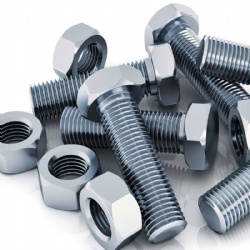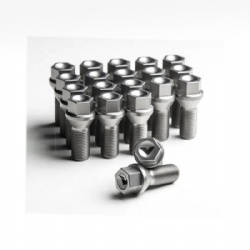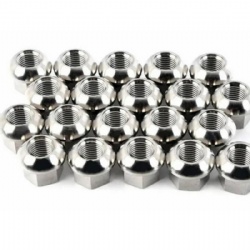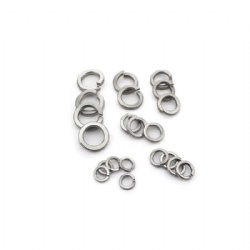Products >> Titanium >> Titanium fasteners
titanium cycling bolt
- Product No.:2023810184629
- Price:perform the lastest price
- Material Grade:Ti. Gr1, Gr2, Gr5, Gr7, Gr12
- Size:M6, M7, M8
- Test:Mechanical and chemical test
Description for titanium cycling bolt
When it comes to cycling, there are a lot of different components that you need to take into account. One of the most important parts of your bike is the bolts. The bolts hold everything together and if they are not made of high-quality materials, they can easily break and cause serious damage. That is why we recommend using titanium cycling bolts. Titanium is one of the strongest metals out there and it is also very light-weight, which is perfect for cycling. The titanium gr5 is the most common type of titanium used for cycling bolts and it is known for its high strength and light-weight properties. Another great thing about titanium is that it is very resistant to corrosion, which is perfect for use in all types of weather conditions.
How to choose the correct titanium alloy bolt for your application?
There are a number of alloys available for use in titanium bolts. The most common alloys used are Grades 5, 23 and 26. Grade 5 is the most widely used alloy for titanium bolts due to its high strength and low weight. It is also the most expensive alloy. Grade 23 is a lower cost alternative to Grade 5 that still offers excellent strength and corrosion resistance. Grade 26 is the least expensive alloy but it is not as strong or corrosion resistant as the other two alloys.
When choosing the correct alloy for your application, it is important to consider the strength, weight and corrosion resistance requirements of your project. Grade 5 is the strongest and most expensive alloy, so it should be used when maximum strength is required. Grade 23 is a good choice for applications where weight is a concern but strength is still important. Grade 26 is the least expensive option but it does not have the same strength or corrosion resistance as the other two alloys.
Titanium cycling bolt size:
the general sizes applied in titanium bolts for cycling
are M6, M7, M8. the popular lengths are 10mm, 12mm, 15mm, 18mm. If the thread is overspec (longer than it needs to be), it can bottom out and strip the threads in the carbon. This is especially important for riders who weigh less than 165 pounds/75 kilograms.
There are two main types of threads that are used in titanium bolts for cycling: metric and imperial. Metric threads are the most common and are what you'll find on most off-the-shelf titanium bolts. Imperial threads are less common but offer a tighter fit. Both types of threads have their advantages and disadvantages, so it's important to choose the right type for your needs.
Titanium bolts are available in a variety of grades, but the two most commonly used grades are 5 and 9. Grade 5 titanium is the most expensive but it offers the best performance. Grade 9 titanium is less expensive but still offers good performance. If you're looking for the best possible performance, then you'll want to go with Grade 5 titanium. If you're looking for a more budget-friendly option, then Grade 9 titanium is a good choice.
When it comes to choosing the right titanium bolts for your needs, there are a few things to keep in mind. First, you need to decide what grade of titanium you want. Second, you need to decide what size and thread type you need. And finally, you need to decide what length you need. Once you've considered all of these factors, you'll be able to choose the right titanium bolts for your needs.
General sizes:
- Diameter: M3, M4, M5, M6
- Length: 20mm, 25mm, 30mm, 35mm
Advantages:
- Lightweight: Titanium is about 45% lighter than steel, making it a popular choice for cycling components.
- Strong: Titanium is stronger than steel, so it can withstand the rigors of cycling.
- Corrosion-resistant: Titanium is resistant to corrosion, so it will last longer than steel components.
- Non-magnetic: Titanium is non-magnetic, so it will not attract dirt and debris.
Material grade:
The most common grade of titanium used for cycling bolts is Grade 5. Grade 5 titanium is a good balance of strength and weight, making it ideal for cycling components.
There is no single standard for titanium cycling bolts, but there are a few common standards that are followed by most manufacturers. These standards include:
- Head type: The most common head types for titanium cycling bolts are hex and Torx. Hex bolts are the most common type of bolt in general, and Torx bolts are becoming increasingly popular for cycling applications.
- Thread pitch: The most common thread pitch for titanium cycling bolts is M5 x 0.8 mm. This thread pitch is compatible with most cycling components.
- Length: Titanium cycling bolts are available in a variety of lengths, depending on the application. The most common lengths are 20mm, 25mm, 30mm, and 35mm.
It is important to note that not all titanium cycling bolts are created equal. Some manufacturers use higher quality titanium alloys than others, and some bolts are manufactured to more precise tolerances. When choosing titanium cycling bolts, it is important to choose a reputable brand and to inspect the bolts for any signs of defects.
Here are some additional tips for choosing titanium cycling bolts:
- Make sure that the bolts are compatible with the components that you are using.
- Choose a reputable brand.
- Inspect the bolts for any signs of defects.
- Use a torque wrench to tighten the bolts to the manufacturer's specifications.
- Apply a light coat of grease to the threads of the bolts before tightening them.
- Inspect the bolts regularly for signs of wear or damage.
Frequently Asked Questions About Titanium Cycling Bolts
Q: What are the advantages of using titanium cycling bolts?
A: Titanium cycling bolts offer a number of advantages over traditional steel bolts, including:
- Lightweight: Titanium is about 45% lighter than steel, which can lead to significant weight savings on a bicycle.
- Strong: Titanium is also stronger than steel, so it can withstand the rigors of cycling without deforming or breaking.
- Corrosion-resistant: Titanium is resistant to corrosion, so it will not rust or corrode over time. This makes it ideal for use on bicycles, which are often exposed to the elements.
- Non-magnetic: Titanium is non-magnetic, so it will not attract dirt and debris. This can help to keep your bicycle clean and running smoothly.
Q: What are the different types of titanium cycling bolts available?
A: Titanium cycling bolts are available in a variety of sizes and head types to suit different applications. The most common head types are hex and Torx. Hex bolts are the most common type of bolt in general, and Torx bolts are becoming increasingly popular for cycling applications because they offer better resistance to stripping.
Q: How do I choose the right titanium cycling bolts for my needs?
A: When choosing titanium cycling bolts, it is important to consider the following factors:
- Size: Make sure that the bolts are the correct size for the components that you are using.
- Head type: Choose a head type that is compatible with your tools and that you are comfortable using.
- Length: Choose bolts that are the correct length for the application.
- Grade: Titanium is available in a variety of grades, but Grade 5 is the most common grade used for cycling bolts. Grade 5 titanium offers a good balance of strength and weight.
Q: How do I install titanium cycling bolts?
A: To install titanium cycling bolts, follow these steps:
- Clean and dry the threads of the bolt and the component that you are attaching it to.
- Apply a light coat of grease to the threads of the bolt.
- Tighten the bolt to the manufacturer's specifications using a torque wrench.
Q: How do I care for titanium cycling bolts?
A: Titanium cycling bolts are relatively low-maintenance, but it is important to follow these tips to prolong their lifespan:
- Regularly inspect the bolts for signs of wear or damage.
- If you notice any damage, replace the bolt immediately.
- Avoid over-tightening the bolts, as this can damage them.
- Apply a light coat of grease to the threads of the bolts before tightening them.
Contact Us

Name: Mr. Ren
Tel: +86-18292471213
E-mail: info(at)intemetal.com
Add: Middle Section Baotai Road, Weibin District, 721013, Baoji, Shaanxi Province, China





















